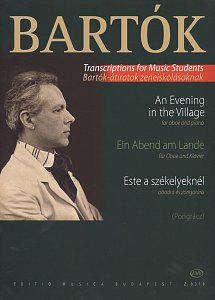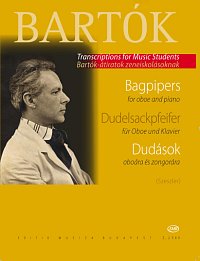BARTÓK: An Evening in the Village / composition for oboe and piano
| Publisher | EDITIO MUSICA BUDAPEST |
| Genre: |
classical & sacret
spirituals, folk, country & traditional |
| Arrangement: | melody / piano |
| Cast: | solo |
| Format: | sheet music |
| Series: | Transcriptions for Music Students |
Parameters
| Product code: | 8318 |
| Composer: | Bartók, Béla |
| Arranger: | Pongrácz, Péter |
| No. of songs: | 1 |
| Pages: | 5 |
| Size: | 23 x 30 cm |
| EAN: | 9790080083185 |
| ISMN: | 979-0080-08318-5 |
| Weight: | 58 g |
Songlist (1)
- An Evening in the Village
Product description
An Evening in the Village was composed in 1908 as no. 5 of the Ten Easy Piano Pieces. It has become one of Bartók's favorite works, which the composer himself was fond of playing at recitals. As he explained in an American interview, it was ''an original composition that is ... with themes of my own invention but ... the themes are in the style of the Hungarian-Transylvanian folk tunes. There are two themes. The first one is a parlando-rubato-rhythm and the second one is more in a dance-like rhythm. The second one is more or less the imitation of a peasant flute playing.'' Bartók also orchestrated the piece in 1931 as no. 1 of Hungarian Sketches.
In 2015 we are launching a series entitled Bartók Transcriptions for Music Students to mark the 70th anniversary of the composer’s death. This involves reissuing our tried publications, and publishing some further, new transcriptions that fulfill in every respect the strict aesthetic demands of the earlier ones. We trust these publications will allow us to introduce still more music students to the realm of one of the great geniuses of 20th-century music.
Béla Bartók (1881-1945), full name Béla Viktor János Bartók, was a Hungarian composer, pianist and and music scientist. He emigrated to the USA in 1940 because of his opposition to Hungarian fascism. Together with Leoš Janáček and Zoltán Kodály, he is one of the composers whose significant source of inspiration was folk music. He is considered one of the most important composers of the 20th century.







